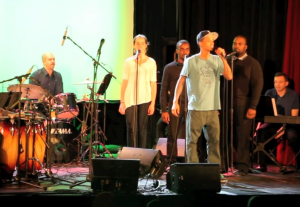 A shy teenager held the microphone tight in his hand, his St. Louis Cardinals baseball cap pulled low over his eyes. His voice cracked and he stumbled over his words as he thanked everyone for coming to the show. It was the first time the boy, Mathew (last name withheld at the request of the Department of Probation), 16, had ever performed in front of a formal audience. The drummer kicked the drum pedal and in an instant the auditorium was awash in blue and pink lights.
A shy teenager held the microphone tight in his hand, his St. Louis Cardinals baseball cap pulled low over his eyes. His voice cracked and he stumbled over his words as he thanked everyone for coming to the show. It was the first time the boy, Mathew (last name withheld at the request of the Department of Probation), 16, had ever performed in front of a formal audience. The drummer kicked the drum pedal and in an instant the auditorium was awash in blue and pink lights.
They illuminated Mathew as he stood in the center of the stage.
Behind him a full band complete with back-up singers swayed to the music and began to sing “Never, never, stop.”
Mathew began nodding his head in time with the rhythm and started to rap the lyrics he wrote only two months earlier with the aid of professional musicians. He got the opportunity to create his song through a new collaboration between Carnegie Hall’s Weill Music Institute and the Department of Probation in New York City.
He explained that the song, “Never Stop Tryin,’” came from a desire to be persistent in the face of adversity.
“Never stop trying to achieve your goal because if there is something that you want you’re never too old and you are never too unable to chase the dream that you want,” Mathew said.
He was the last of nine in the probation system to perform. The one-hour concert, which began at 7 p.m., featured a variety of songs including ballads, blues and rap. One after another, the teens got up to perform what they had composed. There were lyrics about parents abandoning children, blues songs about poverty and hunger, and raps about never giving up.
The workshop, created by Carnegie Hall’s Musical Connections program, was the first partnership of its kind with the Department of Probation. The young participants performed their written pieces live at Harlem’s Oberia D. Dempsey Multi-Service Center, a Neighborhood Opportunity Network Center.
The goal is to give the youth on probation exposure to the arts through music and ultimately create a lasting positive influence in their life.
“For the past four years we have been looking at how music can make a difference in the lives of court-involved youth,” said Ann Gregg, director of community programs at Weill Music Institute. "We are working across the city in multiple kinds of settings and what we notice is, when situations are different, music still has a powerful role in the lives of youth. Particularly when we allow them to express their own ideas through songwriting.”
The project was a three-month workshop on songwriting. The teens participated in writing exercises like penning letters to loved ones and games like word play that eventually led to song lyrics. These lyrics were then put to music with the help of composers and artists Thomas Cabaniss and the band Nos Novos. The teens then got to record their songs in a studio. The workshop culminated with the live performance of their material.
The program taps into the creative potential of people confronting difficult circumstances such as disabilities and poverty through music, Gregg said. The power of music, even through a single performance or in composing a single song, can make a difference in their lives, he added.
“The kids to begin with are pretty demoralized because they just run into to some patch of trouble,” said Cabaniss.
Gregg said early on in the process it was a challenge to get them to think about tapping into their experiences and turning it into structured art.
“But once they get there they were like, ‘This is a really powerful way to get my message across,’” she said.
In New York City there are more than 27,000 people on probation citywide. Almost one third of them are young adults between the ages of 16 and 24, according to the Department of Probation.
They recently launched Neighborhood Opportunity Networks, or NeONs, in five New York City communities. These offices put resources directly in neighborhoods with high concentrations of residents on probation. The Oberia D. Dempsey Multi-Service Center where the performance took place is a NeON in Harlem. This office assists about 75 young adults on probation.
“We were trying to do things differently and build on the kids strengths. And they liked what we were doing and they sort of came at us and said, can we work together?” said Vincent Schiraldi, Department of Probation commissioner.
Musical Connections, an initiative run through Carnegie Hall, was set up about four years ago and reaches out to people with difficult circumstances, such as juveniles on probation, and brings music into their lives. In the past the program has worked with health care facilities, the homeless and adults in prison. This year is the first they have collaborated with Department of Probation.
After the performance, Mathew danced off stage to a cheering audience. He hugged his friends and greeted his new fans including his probation officer, Yansi Moultrio. She helped him get into the songwriting workshop and came to see his performance.
“I am happy because we can say that through music and through other stuff kids can change,” Moultrio said. “They understand that you could be writing, composing, you could be making your own piece of music and practicing. So this definitely changes life a little bit, turned around for good.”